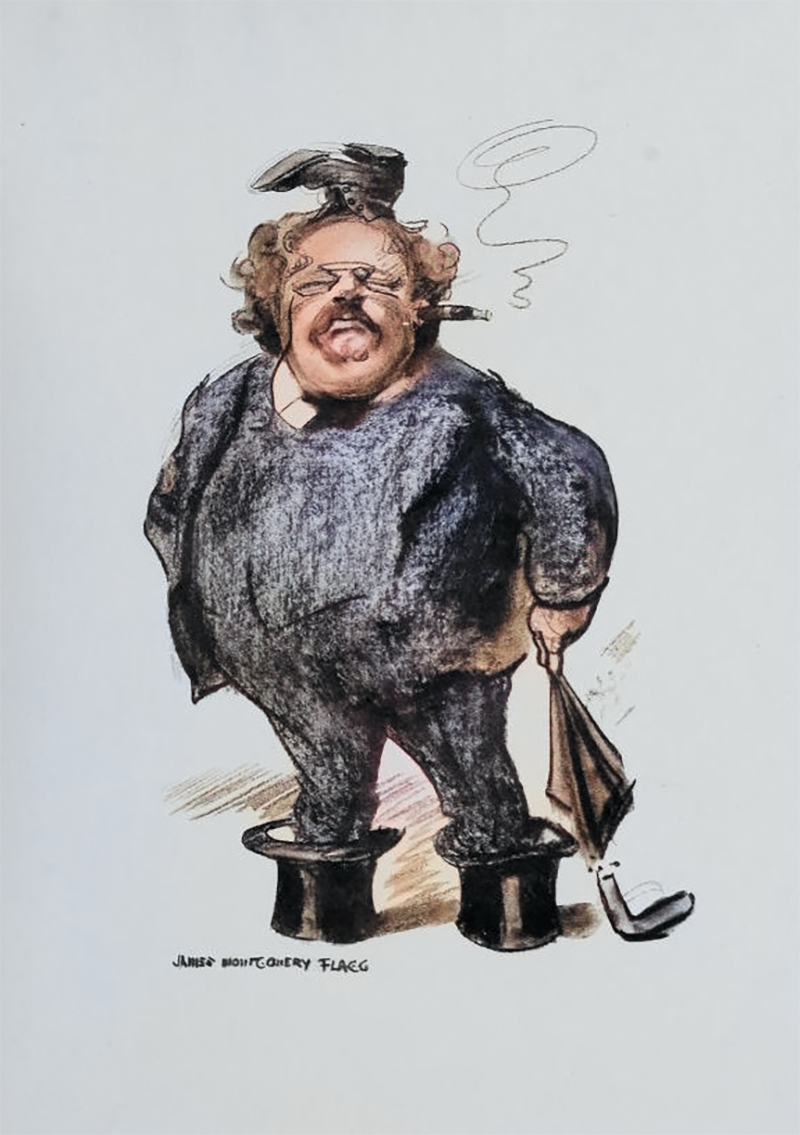June 14 marks the 31,776th pirouette that our planet has made on its axis since the death of the great G.K. Chesterton. His obituary in the New York Times labeled Chesterton “the most exuberant man in English literature.” During Chesterton’s memorial service, Fr. Ronald Knox pointed to a fact that he thought far more important: “The public discovered him in the early years of the (20th) century: it was not till 20 years later that he discovered himself.”
When Gilbert Keith Chesterton converted to Catholicism in 1922, the event sent shockwaves through the literary establishment, though it is hard to understand why it came as such a surprise. How could the creator of the wise and compassionate Fr. Brown not have found a home in the Roman Catholic Church?
Long before his conversion, in 1908, Chesterton wrote what is probably his most famous work, Orthodoxy. Most people regard it as a classic example of Christian apologetics, but it is also a rip-roaring travel guide to human existence and our cosmos. Chesterton understood that the Gospels don’t just contain good news about the world to come; they also share some rather astonishing truths about our present existence and the strange predicament in which we find ourselves, as he explains in the fourth chapter of the book, “The Ethics of Elfland”:
“We have all read in scientific books, and, indeed, in all romances, the story of the man who has forgotten his name. This man walks about the streets and can see and appreciate everything; only he cannot remember who he is. Well, every man is that man in the story. Every man has forgotten who he is. One may understand the cosmos, but never the ego; the self is more distant than any star. Thou shalt love the Lord thy God; but thou shalt not know thyself.”
To become aware that “we have all forgotten our names” is to set off on a quest for one’s identity. It is also to rediscover the true, magical nature of existence. This sense of wonder is something that Chesterton says he felt even before he embraced Christianity:
“… the strongest emotion was that life was as precious as it was puzzling. It was an ecstasy because it was an adventure … The goodness of the fairy tale was not affected by the fact that there might be more dragons than princesses; it was good to be in a fairy tale.”
Reading Chesterton is the perfect remedy when we feel cynical or realize that the world is growing tedious for us. Cynicism and tedium are symptoms of a materialism that long ago emptied all sense of magic from our souls. Modern life is generally safer, easier, and more efficient than it was in the past, but it can also seem more boring. We ignore the everyday marvels around us, seldom bothering to raise our eyes from our cell phone screens. That fluffy white mountains float above our heads or that the strangers we pass on the street contain entire universes in their heads are held to be mundane facts, unworthy of notice. But Chesterton claims that if we were truly sane, we would put down our devices and gape at the world in awe and wonder, stunned not just by the utter strangeness of things but by the even stranger fact that anything exists at all.
Chesterton’s insights, though expressed in an original way, are not really original in the least. In the introduction to Orthodoxy, he confesses that “with the utmost daring [I have] discovered what has been discovered before.” Chesterton gives us the example of a sailor who went off to explore exotic lands and ended up rediscovering the England he embarked from. “I am the fool of this story,” he assures us, “and no rebel shall hurl me from my throne.”
To become a fairytale philosopher is simply to rediscover the Christian view of reality that was right in front of us all along. It turns out that the fairy tales of our childhood were in some sense a more accurate description of reality than all the complicated theories generated by science and sociology. God became a babe slumbering in a manger and when the child grew up, he informed us that whenever we come upon a prisoner in a cell or a filthy beggar in the street they will really be Him. Chesterton understood that the problem with contemporary Christians is not that we are not serious enough about the Faith, but that we are not frivolous enough to take Jesus at his word — and that is why the view outside our window can sometimes seem so drab.
So try to spend an afternoon with G.K. Chesterton this week. Read a chapter of Orthodoxy or The Man Who Was Thursday or one of his Father Brown stories. Then go take a brisk walk around your neighborhood and perhaps you will realize that you are not really living in New Jersey or Liverpool or Addis Ababa or wherever you believed you were currently residing. Instead, you are really living in the Elfland of the old fairytales and, much to your surprise, it turns out that you are really a pilgrim in an exotic land who has embarked on a great adventure.




